- Home
- Captain W E Johns
03 Now To The Stars Page 4
03 Now To The Stars Read online
Page 4
'Have they no fish in their water?'
They do not know, and cannot find out, for they dare not go near the water except to fetch some for drinking; and this is so dangerous because of the lizards that many men must go together, and even then some are killed.'
'How do these men kill the lizards?' inquired Tiger.
'They have spears, but they are not good, for which reason we bring some, as we have today. But they lose them when they are torn from their hands by lizards which, when they are wounded, rush back to the water.'
'What these fellers want,' put in Toby, 'is a rifle or two.'
Tiger, who had a rifle on board, put it in a convenient place, and they all watched the little planet, now drawing near, with mounting interest.
Not that much could be seen, for there was a heavy layer of cloud. The ship passed through this and the strange new world lay exposed to view.
Had it not been for Vargo's description Rex would have wondered what they were approaching, for the surface was a variegated pattern of black and white, the black areas presumably being water. There was no big land mass, only a vast archipelago of islands.
There was far more water than land. Had he not known of the salt he would have thought they were looking on an Arctic zone, the white being caused by frost rather than snow, for as the ship went nearer the white turned out to be pale grey.
Vargo said that Borron, who spoke the Linian language, had been informed that there was a legend among the people that long ago they had travelled from island to island in boats: but that was no longer possible on account of the water-lizards. Now the people had to remain where they were.
To Rex the scene presented was a world as hideous as could be imagined; but the Professor made no secret of his delight, for, as he declared, Lin supported his theory that life could exist in any conditions, no matter how impossible they might seem to those who dwelt on worlds where conditions were entirely different.
Rex observed that they were dropping down on one of the larger islands, although its area could not have been more than twenty square miles. The uniform colouration made it difficult to see anything clearly, but he made out a stand of trees, not a very large stand, at one end of the island. It had at one time been larger, but all round the outside of the wood - if wood is the right word - the trees had been smashed and splintered as if swept by a hurricane. Presently he was to see the sort of hurricane that had been responsible. As for the trees themselves, they were something in the nature of a cross between a palm and a monkey-puzzle; but it was a species unknown to him. Everything was grey, but he could see huts in the trees, with rough timber platforms running from one to the other.
As soon as the Tavona touched down, on an open area less than a hundred yards from the trees, the place came to life when what appeared to be a swarm of grey apes descended from the tree-top village with astonishing agility and raced, shouting, towards the ship.
Borron was not in the least intimidated, and passing the word that spacesuits would not be required threw open the double doors of the airlock chamber.
Knowing what he knew Rex was not particularly surprised by what he saw, particularly as he recalled that even Earth could boast a race of pygmies, in the West African jungle; but that is not to say he was not startled. The men were men. Of that there was no doubt, for aside from their appearance, which was not too far removed from normal, they kept up a chatter of conversation. Their skins were white, as was their hair and beards, although how far this was due to an incrustation of white, crystalline powder, presumably salt, was not easy to determine. They were short in stature, none being more than four feet tall, and their arms were abnormally long, as might have been expected in a race of tree dwellers. Their clothing was standard, and comprised a long shirt and high boots of what looked like grey crocodile hide. Every man carried at least one spear, some several.
Rex followed the others out to find himself in an atmosphere that was both close and heavy It had a slightly suffocating effect, but that was all. The Linians did not seem in the least surprised to see them, although this, too, was to be expected, as they had often been visited by spaceships. The women, distinguishable by long hair, remained near or at the doors of their huts, which were built either in the trees themselves or on platforms high off the ground between them. These were of a dirty grey colour. Indeed, this was the colour of the entire landscape and everything on it. Nothing more drab and miserable could have been imagined, and Rex was sorry for the poor wretches who had to endure it, although, to be sure, they seemed cheerful enough, knowing nothing better.
'If the people on Earth could see this place they'd be well satisfied with what they've got,'
remarked Rex, watching the Professor, with his spectacles on the end of his nose, taking some snapshots of the Linians, who were afterwards rewarded, to their almost hysterical delight, with a bag of caramels.
Some rushed off and brought back some small skin bags of salt, apparently all they had to offer.
'I hope the Professor won't stay here much longer,' went on Rex, to Tiger, who was taking the opportunity to have a smoke. I'm feeling a bit sick, and my mouth's as dry as a chip.'
'That will be the salt,' answered Tiger. 'The stuff is in the air as well as in everything else.
I think we've seen all there is to see.'
In this, however, he was wrong. He must have forgotten the lizards!
They were all reminded of the other inhabitants of the planetoid when Toby called attention to several long white objects moving swiftly across the inky surface of the water about a quarter of a mile away. A Linian scout must have been on the watch, for there was a shrill yell, and in a moment the little men were streaking for their elevated houses.
'The lizards,' said Vargo simply, pointing.
Still no one paid much attention, except perhaps the Professor, who focused his glasses on them. 'My word!' he exclaimed. 'This is interesting. Very interesting indeed.'
The beasts may have been interesting, but Rex could have found a more descriptive word as the first of the creatures shot on to the dry land like a fast boat running ashore, and without pause came lumbering on up one of the several broad tracks which Rex had supposed to be man-made roads, but now had reason to think were game-tracks; or rather, lizard tracks.
With the others following more slowly the leading lizard came on at a speed which Rex, who had always regarded the lizard as a slow-moving reptile, could hardly believe. The forward movement was not so much a gallop as a glide, and the reason for this, as he observed as the beast drew nearer, was because it had not the usual four legs, but several.
These moved so fast, in the style of those of a centipede, that he found it difficult to count them; but he thought there were ten. About thirty feet long, the creatures were not unlike crocodiles, although here he realized that he was falling back on an Earthly name to describe something which did not exist on Earth. In colour the brutes were, like everything else, a pallid white, which for some reason made them look particularly horrible.
They're some pretty beauties, I must say,' remarked Toby. 'They look halfway between a dragon and a centipede. Quite wizardly in their own way. From the way the tree-top boys took evasive action they must be scared rigid.'
'Back to the ship,' ordered Vargo.
Just a minute! Let's watch this. What are they going to do?' said Tiger, loading his rifle.
'They will attack the men,' answered Vargo. 'And if we stay here they will attack us, too.'
'But the men are in the trees,' the Professor pointed out.
'They are in the trees, but that does not make them safe,' returned Vargo. 'You will see.
You are watching a struggle for survival in its final stages.'
Such a sight as Rex never expected to see was now presented. The leading lizard, reaching the trees, chose one, and rearing up on its hind legs began tearing at the trunk with its teeth and claws in a bestial fury that was dreadful to behold.
Great Heaven!
' cried the Professor. 'He'll have that tree down.'
This was so obviously going to happen that no one denied it. But the uncouth beast was not to have things all its own way. With an incredible din of yelling and screaming, spears began to rain down on it from above
- not that they seemed to be having much effect. Some did not even penetrate the brute's hide, but glanced off harmlessly. What amazed Rex was the courage of the little men, for far from abandoning the tree being attacked they came to it from all sides. What was going to happen when the tree fell, as presently it must, was something Rex preferred not to think about. Salt crystals, dislodged by the shaking, fell like a steady rain of diamonds to give a final touch of fantasy to the picture.
'In Africa I once saw the Masai take on a lion with their spears, but this beats anything I ever heard of,' remarked Toby. 'What does that chap think he's going to do?'
Rex stared as a little old man, with a rope coiled over one arm, started down towards the beast's slavering jaws. The noise was indescribable.
Toby's question was answered by the man himself. Halting only a yard from the monstrous face, with wonderful dexterity he threw a loop round the jaws. This was instantly pulled taut by the men above, thus closing the jaws. The little man, taking another rope, now jumped to the ground and tried to get a noose round the lizard's tail.
'He's mad!' cried Rex.
'They must kill the lizard for food or die of starvation,' said Vargo simply.
'Well, that's one way of getting the Sunday joint, but I should have to be mighty hungry before I tried it,' said Tiger.
The old man succeeded in his purpose and dashed round the tree with the obvious intention of securing the tail to it. Speed was necessary, for the other lizards were getting close. At this juncture, however, the business took a turn that was obviously not in the programme. The tree, weakened by the attack made on it, began to bend under the beases weight, and the broken trees which Rex had thought to be the result of a hurricane were explained. This frightful business must, he realized, be a common occurrence.
Over went the tree with a crash, taking the beast with it. The men who had been on it fell off like ripe plums. The strain on the ropes being released the lizard tore itself free, and bellowing with rage went after the old man who had played the leading part in the drama.
It would have caught him, too, had not Tiger taken a hand.
'If our little St George can't kill his dragon I'd better see what I can do,' said he. Raising his rifle he took quick aim and fired.
Making a terrible noise the beast reared up, tearing at its side. Again Tiger's rifle cracked, and this time the bullet must have found a vital spot, for the beast fell on its back and lay kicking. The Linians did not wait for it to die, but with shrieks of triumph fell on it with their spears. When its struggles ceased the men began a war-dance round their hereditary foe. This did not last long, however, and in a few minutes the entire tribe, men, women and children, were hacking their enemy to pieces.
'A pretty example of nature in the raw,' remarked the Professor, as they stood watching the gory spectacle. 'Before we criticize we should do well to remember that our ancestors on Earth must have gone through a period of this sort of thing.'
'They survived. Here they look like losing. I wonder why?' said Toby.
'I think I can answer that,' rejoined the Professor. 'Our ancestors were better armed. They knew how to work flint, and later, bronze. The spears and choppers these fellows are using appear to be singularly futile, as if they have no points, or edges.'
It so happened that a man came over with a horrid lump of flesh and offered it, apparently as a present. The Professor took his spear from him and adjusting his spectacles examined the point. He scratched it with a thumbnail. Then, taking out his penknife, he made a groove. The face he turned to those watching him broke into a whimsical smile. 'Observe the irony of fate, gentlemen!' he exclaimed. These silly fellows have chosen the most useless of all metals for the most important of all work, which is to preserve their lives.'
'What is it?' asked Tiger.
'Gold.'
Gold!'
'Yes, and fine gold too.'
'There is no other metal here,' explained Vargo, who was listening.
'That's a joke,' said Toby.
'I don't know,' put in Tiger. 'Talking of ancestors, if legend is true the Druids used golden sickles to cut the mistletoe in their sacred oaks.'
The Professor chuckled. 'Sheer nonsense, my dear fellow. In the first place, in Britain gold does not exist, and never has existed, in sufficient quantity to make tools. We find flint and tin and bronze, but not gold weapons. Secondly, if gold had existed it would not take an edge to cut wood. And finally, oak is one of the few trees on which you will never find mistletoe. I'm sorry to spoil a pretty story but we must stick to the truth.
Civilization has never enough gold. Here the tragedy of these poor people is, they have nothing else. To them one rifle would be worth more than all their gold. Not that I think these people would ever make much progress towards a better life.'
'Shall I give them a rifle?' suggested Tiger.
'That would only hasten their extermination. According to Vargo they can live nowhere else but here. At present they die one by one. Give them a rifle and they will, by destroying their food supply, die in numbers from starvation.'
I'll see they are not hungry for a little while,' said Tiger, and advancing towards the herd of lizards coming slowly up the track killed six of them - to the great joy of the Linian population.
At this point Rex was sick.
'I'm beginning to feel the effects of this salt-laden atmosphere myself,'
admitted the Professor. Our visit here has been most enlightening, but I think we have seen all that is worth seeing, so as time is precious we might leave these wretches to enjoy their disgusting lunch and move on to a more salubrious planet.'
They returned to the ship.
5 Worlds of wonder
As the Tavona resumed its tour Rex could not help thinking about the unfortunate people on the world now dropping away below them. The more he thought about their wretched plight the harder he tried to think of a solution to their problem of life or death. In such conditions there could be no hope of progress.
He felt sure that if the lizards could be brought under control it ought to be possible to introduce an alternative staple article of food. There should be vegetables that would tolerate the saline soil. The coconut palm, for instance. On the Pacific islands that most useful tree often grew with its roots in the sea. The water might produce fish. If there was none there already they could be introduced from elsewhere - perhaps from Earth. In some countries salt fish was one of the chief articles of food.
He conveyed these thoughts to the Professor, saying that if the lizards could be exterminated and fish put in their place the Linians would soon learn how to catch them.
If they hadn't fish hooks already they could soon make some.
The Professor smiled wryly. 'You can be sure that they know nothing of fish hooks, and as for inventing them ... Always remember, Rex, the more primitive form of human life the slower is the process of invention and development. On Earth the modern fish hook may have taken a million years to produce. At first, and for how long we don't know, hooks were made of thorns, chipped flint and carved shells. These are sometimes found in ancient tombs.
'The big jump forward came when, about six thousand years ago, a genius of his time made a hook of bent metal. Copper. It was a great and wonderful invention for the human race, for it must have increased enormously the supply of fish for food. But two thousand years more were to elapse before another man had a brainwave and put a barb on his hook.
Again we know that from tombs of the period. Think of it! From the first flight to the modern aeroplane, from radio to television, took a mere fifty years; but from a plain hook to one with a barb required two thousand. The invention of the barbed hook was certainly of greater benefi
t to humanity.
You can't eat aeroplanes, and television won't save you if you are starving; but the barbed hook again stepped up the supply of fish for the hungry crowds in the public markets of the old world.' The Professor popped a caramel into his mouth.
'So you see,' he concluded, 'a simple thing like a fish hook provides us with a good example of the time factor in early technical invention. To an Ancient Briton a barbed copper hook would have been worth more than all the gold in Lin, where I should be very surprised indeed to find one.
But never mind. We'll save them a few thousand years of headache by giving them some hooks - when there are fish to catch. I will think about it.'
The next port of call on Borron's route was Norro, a world of strong men; but Vargo came over to say that as they would pass some lesser planetoids on the way the Professor might like to see them. Not that there was much of interest. One was entirely covered with water. Another was clothed in tall grass, and another was the place of ice of which they had been told; where the people in attempting to tilt their world to their advantage had melted the polar ice-caps and so destroyed themselves. If they called there spacesuits would have to be worn.

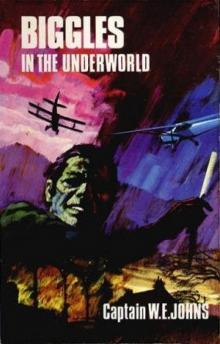 Biggles in the Underworld
Biggles in the Underworld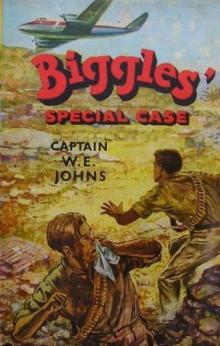 Biggles' Special Case
Biggles' Special Case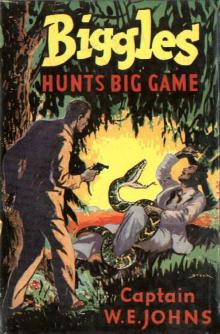 34 Biggles Hunts Big Game
34 Biggles Hunts Big Game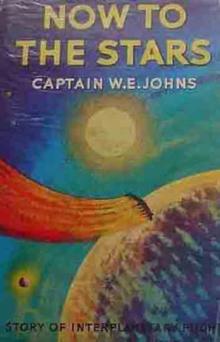 03 Now To The Stars
03 Now To The Stars 55 No Rest For Biggles
55 No Rest For Biggles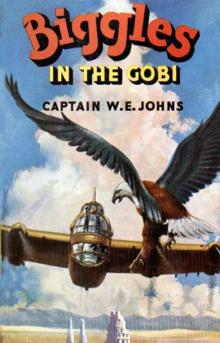 46 Biggles in the Gobi
46 Biggles in the Gobi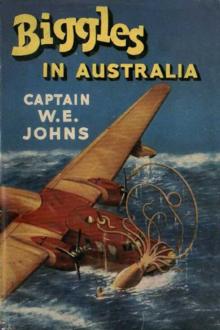 52 Biggles In Australia
52 Biggles In Australia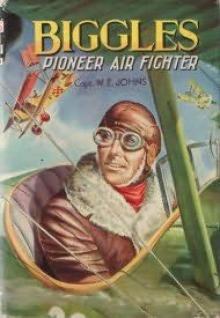 51 Biggles Pioneer Air Fighter
51 Biggles Pioneer Air Fighter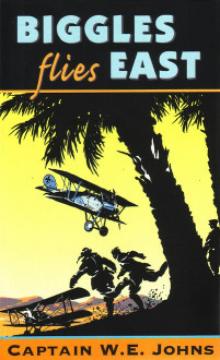 05 Biggles Flies East
05 Biggles Flies East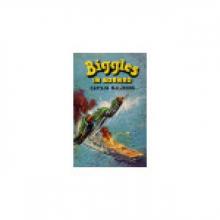 28 Biggles In Borneo
28 Biggles In Borneo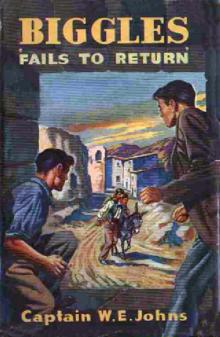 29 Biggles Fails to Return
29 Biggles Fails to Return 55 No Rest For Biggles (v2)
55 No Rest For Biggles (v2)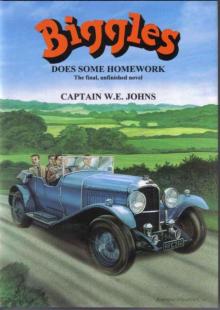 Biggles Does Some Homework
Biggles Does Some Homework Biggles of the Camel Squadron
Biggles of the Camel Squadron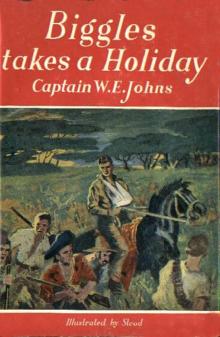 35 Biggles Takes A Holiday
35 Biggles Takes A Holiday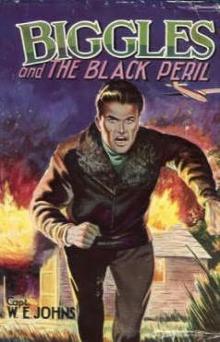 Biggles And The Black Peril (06)
Biggles And The Black Peril (06)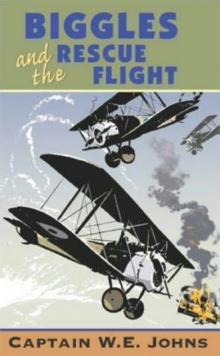 17 Biggles And The Rescue Flight
17 Biggles And The Rescue Flight Biggles Learns To Fly
Biggles Learns To Fly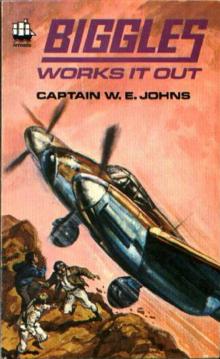 40 Biggles Works It Out
40 Biggles Works It Out 05 Biggles Learns To Fly
05 Biggles Learns To Fly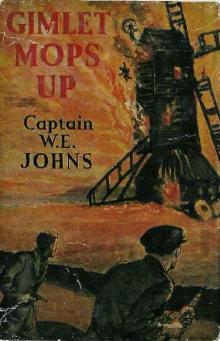 04 Gimlet Mops Up
04 Gimlet Mops Up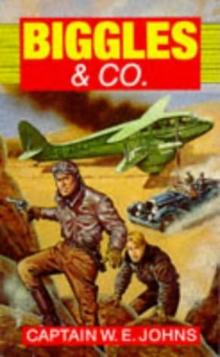 10 Biggles and Co
10 Biggles and Co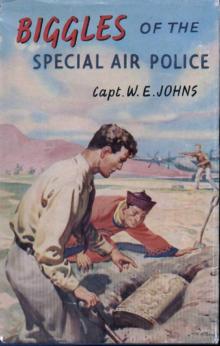 47 Biggles Of The Special Air Police
47 Biggles Of The Special Air Police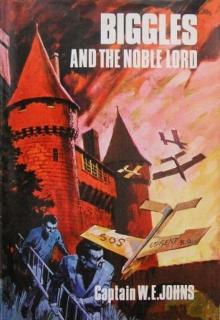 Biggles and the Noble Lord
Biggles and the Noble Lord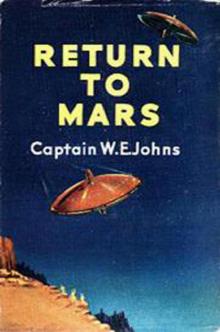 T2 Return To Mars
T2 Return To Mars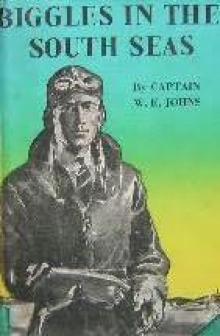 21 Biggles In the South Seas
21 Biggles In the South Seas No Rest For Biggles
No Rest For Biggles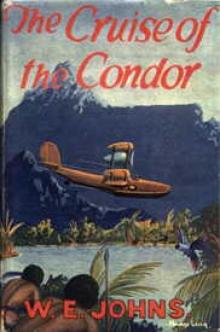 Biggles In The Cruise Of The Condor (02)
Biggles In The Cruise Of The Condor (02)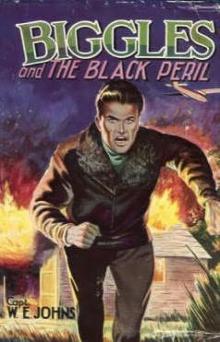 06 Biggles And The Black Peril
06 Biggles And The Black Peril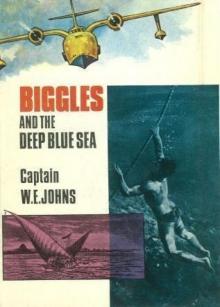 Biggles and the Deep Blue Sea
Biggles and the Deep Blue Sea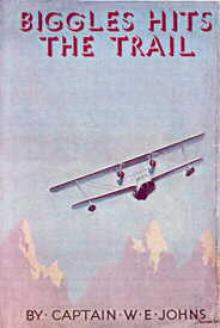 06 Biggles Hits The Trail
06 Biggles Hits The Trail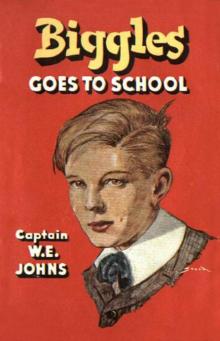 39 Biggles Goes To School
39 Biggles Goes To School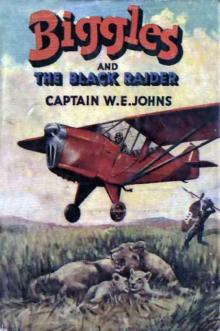 44 Biggles and the Black Raider
44 Biggles and the Black Raider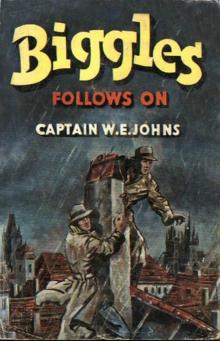 42 Biggles Follows On
42 Biggles Follows On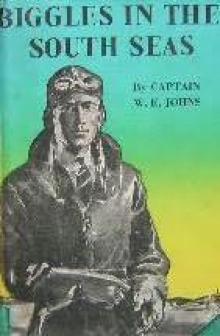 Biggles In the South Seas
Biggles In the South Seas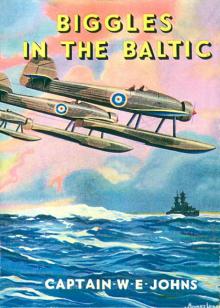 21 Biggles In The Baltic v3
21 Biggles In The Baltic v3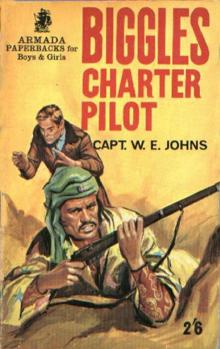 27 Biggles - Charter Pilot
27 Biggles - Charter Pilot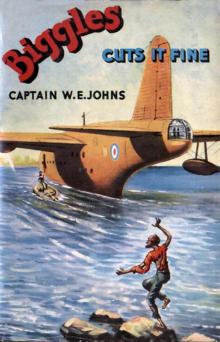 49 Biggles Cuts It Fine
49 Biggles Cuts It Fine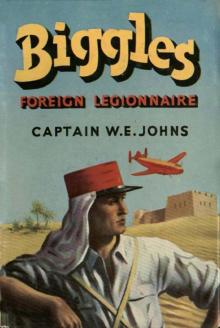 51 Biggles Foreign Legionaire
51 Biggles Foreign Legionaire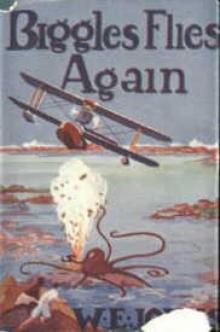 04 Biggles Flies Again
04 Biggles Flies Again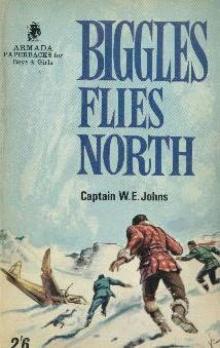 16 Biggles Flies North
16 Biggles Flies North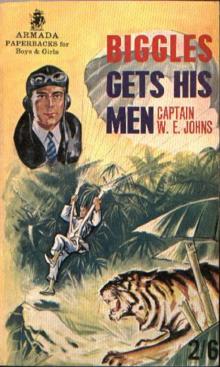 37 Biggles Gets His Men
37 Biggles Gets His Men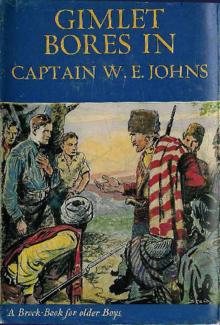 07 Gimlet Bores In
07 Gimlet Bores In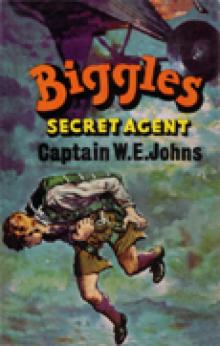 19 Biggles Secret Agent
19 Biggles Secret Agent 32 Biggles In The Orient
32 Biggles In The Orient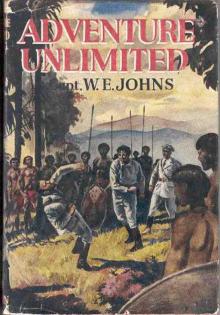 Adventure Unlimited
Adventure Unlimited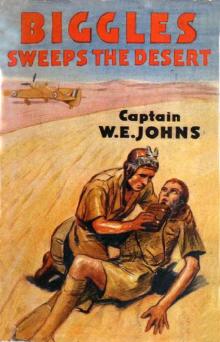 26 Biggles Sweeps The Desert
26 Biggles Sweeps The Desert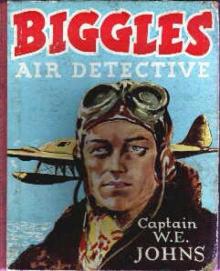 Biggles Air Detective (43)
Biggles Air Detective (43) 36 Biggles Breaks The Silence
36 Biggles Breaks The Silence 14 Biggles Goes To War
14 Biggles Goes To War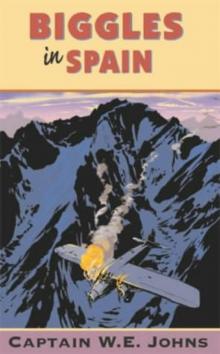 18 Biggles In Spain
18 Biggles In Spain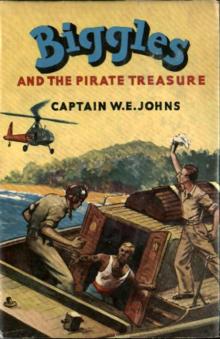 50 Biggles and the Pirate Treasure
50 Biggles and the Pirate Treasure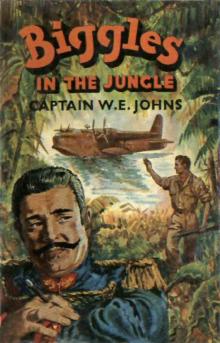 25 Biggles In The Jungle
25 Biggles In The Jungle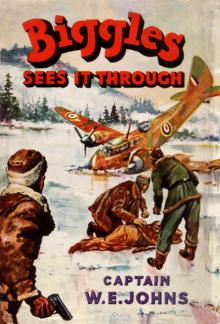 23 Biggles Sees It Through
23 Biggles Sees It Through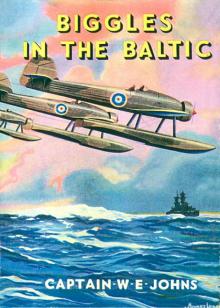 21 Biggles In The Baltic
21 Biggles In The Baltic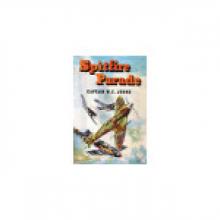 24 Spitfire Parade
24 Spitfire Parade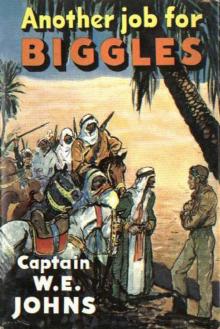 38 Another Job For Biggles
38 Another Job For Biggles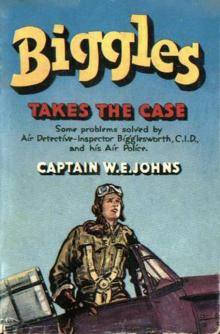 41 Biggles Takes The Case
41 Biggles Takes The Case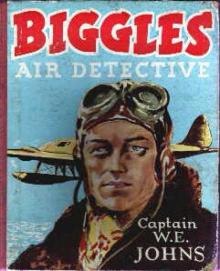 43 Biggles Air Detective
43 Biggles Air Detective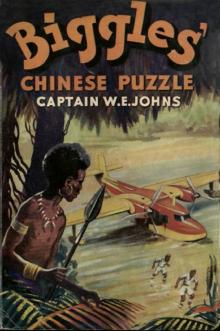 53 Biggles Chinese Puzzle
53 Biggles Chinese Puzzle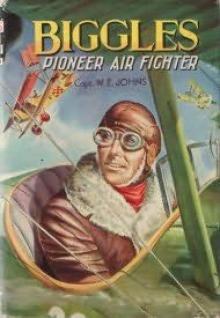 Biggles Pioneer Air Fighter (51)
Biggles Pioneer Air Fighter (51)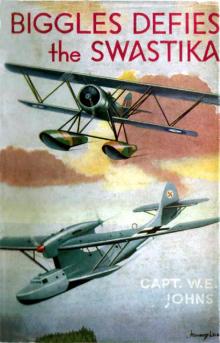 22 Biggles Defies The Swastika
22 Biggles Defies The Swastika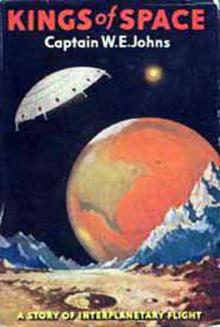 01 Kings Of Space
01 Kings Of Space